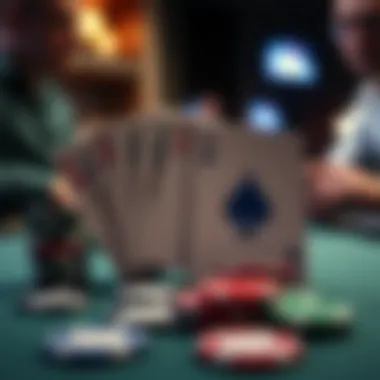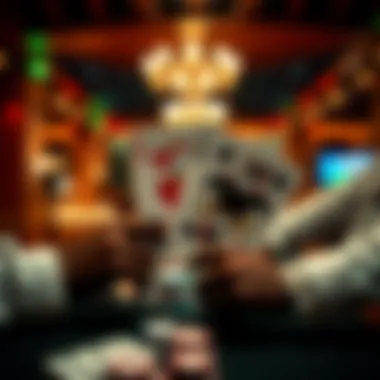The Joker Deck: Exploring Its Impact on Card Games


Intro
The joker deck, with its colorful motifs and ambiguous role in card games, often piques the curiosity of both players and scholars alike. Its place in gaming is not merely supplementary; it has evolved into a distinctive component with the potential to alter game dynamics significantly. Whether you’re indulging in a spirited round of poker, shuffling cards for a family game night, or delving into strategic gambling environments, the joker serves as a wildcard that can shift the tide of play.
Understanding the multifaceted functions of the joker deck is crucial for anyone engaged in the realm of card games. It establishes not only an element of surprise but also introduces layers of strategy that can make or break a player’s odds. This article intends to clarify the origins, applications, and implications of the joker in various gaming contexts, shedding light on a key aspect often overshadowed by the game's more traditional elements.
Game Strategies
Understanding the joker’s role requires a deeper look at gameplay mechanics and strategies that hinge on its inclusion.
Understanding Game Mechanics
To comprehend the joker’s significance, one must first grasp the underlying game mechanics in which it operates. In many card games, like Uno or Canasta, the joker is assigned various functions. In poker, it often serves as a wild card that can substitute for other cards to create a more favorable hand. The joker’s dual identity can create tension as players scope out possibilities, knowing that their opponents hold the potential for unexpected turns of hand, which can heighten the overall suspense of the game.
- Wild Card Functionality: Enhancing strategic decisions.
- Game Variation: Different games utilize the joker differently, adding unique features to each variant.
- Player Skill: Knowing how and when to deploy the joker can shift power dynamics at the table.
By carefully analyzing how jokers impact gameplay, players can enhance their strategic prowess, leading to potentially favorable outcomes in competitive settings.
Advanced Betting Techniques
As players become more familiar with the nuances of gameplay involving jokers, it's prudent to explore advanced betting techniques. Understanding when to raise the stakes or fold can be a game-changer.
- Reading the Table: Being aware of how others are using jokers can aid in predicting their strategies.
- Psychological Play: Players can leverage the unpredictability of the joker to bluff or induce uncertainty in their opponents’ minds.
- Adaptive Strategies: Continuously reevaluating one's strategy based on the evolving dynamics of the game, especially when jokers are in play, is key to remaining competitive.
"In the game of life, just like cards, the joker can be your best asset. Knowing how to play them can mean the difference between victory and defeat."
With these advanced techniques, players not only enhance their overall game but may also find greater enjoyment in the process.
Responsible Gambling
Navigating the complex world of cards also necessitates an awareness of responsible gambling practices. Utilizing the joker wisely in conjunction with good gambling habits can lead to a more satisfying experience.
Setting Limits and Budgets
Every successful gambler knows the importance of setting clear limits. Here’s how the joker can incorporate itself into a responsible approach:
- Establish a Budget: Determine how much you can spend, and portion that with respect to playing styles with jokers.
- Session Limits: Decide ahead of time how long to play, especially as the excitement of joker play can make time fly.
- Withdrawal Strategy: If you find a winning streak due to the joker’s presence, take some time to reassess your approach.
By cementing limits, you can ensure that the thrill of playing with jokers doesn’t translate into negative repercussions.
Recognizing Problem Gambling Signs
Finally, being aware of the signs of problem gambling is crucial. Whether it's due to the excitement of a joker-enhanced game or any other aspect, it's vital to monitor one’s playing habits and behavioral changes.
- Emotional Changes: If you notice heightened levels of anxiety or frustration during play, it might be wise to take a step back.
- Financial Strain: Rising debts and missed payments are telltale signs that gambling is taking over.
- Loss of Control: If it becomes increasingly difficult to stop playing, particularly when chasing losses, it’s time to reassess.
To ensure that the enjoyment of card games remains intact, recognize when it's time to engage in self-reflection or seek help if necessary.
In summary, the joker deck's role extends far beyond mere entertainment. It's intertwined within the fabric of gaming strategies and responsible gambling, making it a vital topic of exploration for anyone serious about mastering the art of card play. Understanding both its strategic applications and responsible management can lead not just to improved gameplay but also to a richer, more enjoyable experience.
Prelims to the Joker Deck
The Joker Deck, often regarded as an unconventional yet intriguing facet of card games, carries with it a depth of meaning that extends beyond mere gameplay. Not only do these cards inject an element of surprise into games, but they also serve as a bridge between casual play and strategic maneuvering. Understanding the Joker's role is imperative for players, game designers, and industry analysts alike, as it opens doors to innovative gameplay dynamics.
The Joker's significance isn't just in its whimsical appearance; it's how it reshapes the conventions of card games. In various contexts, it can act as a wild card, a game-changer that has the potential to turn the tide of competition. This section aims to delve into the definition and characteristics of the Joker Deck, as well as a brief historical overview of its evolution. By doing so, we set the stage for a richer understanding of how these cards function in both casual and competitive gaming environments.
Definition and Characteristics of the Joker Deck
The Joker cards, typically adorned with colorful illustrations and fanciful designs, are unique to standard decks of playing cards. They are an odd couple, so to speak—neither strictly belonging to the traditional suits of hearts, diamonds, clubs, or spades. Instead, they represent a distinct category, often included as a wildcard that players can utilize to shift the balance of a round.


Characteristic features of Joker cards include their lack of a predefined value. In many games, they can represent any card, making them incredibly versatile. Typically, there are two Jokers in a pack, with one often marked as a 'big' Joker and the other as a 'small' Joker, allowing them to serve different functions depending on the game rules.
In terms of design, Joker cards can vary enormously. While some may portray mischievous figures, others might display theatrical representations, reflecting their historical roots in jesters and entertainers. These visual elements amplify their whimsical nature, making them more than just cards but rather symbols of unpredictability and fun in gaming.
Historical Background: The Evolution of the Joker
The evolution of the Joker card is as layered as a good mystery novel. Its origins can be traced back to the mid-19th century, particularly in the United States. Initially introduced as a trump card for the game of Euchre, the Joker soon found its footing as a wildcard in various other games.
Over the years, the Joker has taken on different forms across cultures and games. In the late 1800s, it became popular in the game of Poker, allowing players to expand their strategies and increase the element of surprise. The role of Jokers did not just stop at being a wild card; they also started representing scores in games, giving players the chance to earn extra points or bonuses.
Interestingly, variations of the Joker exist in numerous regions. For instance, in some Asian card games, they embody unique powers based on local traditions and customs. This adaptability has allowed the Joker to thrive, morphing over time as it integrates into different gaming niches.
By documenting the path of the Joker's journey from a simple trump card to a versatile ally in gaming, players can better appreciate its place in card decks of today and recognize how it continues to evolve to meet the demands of modern gaming.
The Design and Structure of Joker Cards
The intricate design and structure of joker cards are often what sets them apart from the rest of a standard deck. They serve not just a functional purpose but also embody artistic expression. From a gaming perspective, the distinct visual traits of joker cards can influence players’ choices, strategies, and even the overall atmosphere of the game. Joker cards have a dual role—they are both a wildcard option and a thematic representation of chaos and unpredictability in a structured game environment.
Visual Elements of Joker Cards
The visual elements found on joker cards are fascinating to explore. Each joker card is often adorned with quirky illustrations, vibrant colors, and symbolic motifs that can vary widely between different decks. Some jokers feature a jester or clown figure, complete with a jingle hat, while others may depict animals or abstract art, depending on the theme of the card deck.
These visuals serve several purposes:
- Attraction: The bright colors and unique imagery catch the eye, making them stand out when dealt.
- Symbolism: In many decks, the imagery conveys a sense of freedom, playfulness, or disorder—concepts that align with their wild card capabilities.
- Innovation in Game Design: Designers may use jokers with specific themes related to the game to provide context or add depth, allowing for a more immersive experience.
These elements not only establish a strong aesthetic appeal but also carry thematic weight that can elevate the excitement and tension in gameplay.
Different Variations of Joker Cards
Variations of joker cards are abundant, and their existence is a reflection of the diverse styles of card games played across cultures. Here are some notable types:
- Standard Jokers: Typically found in most decks, these jokers come in pairs and often feature a jester. They serve as wild cards in many games.
- Artistic Jokers: Certain decks designed for collectors showcase alternate artistic interpretations—such as surrealist or pop-art styles—that resonate with the artistic community.
- Regional Variations: In some Asian card games, jokers may have entirely different depictions, possibly integrating local cultural symbols or themes.
Despite their differences, the foundational role of the joker remains consistent. They provide flexibility in gameplay, acting as stand-ins for other cards and often transforming the dynamics of the game, providing both challenges and opportunities for strategy.
"A Joker in the hand can often yield more than two aces on the table, altering the entire course of a game with one clever play."
In sum, the design and structure of joker cards encapsulate not just their aesthetic values but also their impact on game play. Players, from amateurs to seasoned veterans, understand the importance of these cards—not just as a tool for winning, but as an element that enriches the gaming experience itself. This often unseen depth is vital for capturing the true essence of card games, making the joker a beloved and potent icon in the broader narrative of gaming.
The Functionality of Jokers in Card Games
The Joker is not just a card that occupies space in a deck; its presence brings a level of unpredictability and excitement in various gaming scenarios. In this section, we delve into the roles jokers play and their overall significance in the card game landscape, revealing their multifaceted nature that can enhance or challenge gameplay depending on the context. The flexibility provided by jokers can change the very fabric of strategy and player interactions, making them a topic worth exploring.
Jokers as Wild Cards: Definition and Purpose
A wild card is typically defined as a card that can represent any other card in play. This adaptability is where the joker shines. When incorporated into a game, it serves the purpose of filling gaps, whether as a substitute for a missing card or a catalyst for more complex strategies. A joker allows players to create unexpected combinations, thus turning a potentially losing hand into a winning one.
This capacity to switch identities makes the joker particularly intriguing in games like Texas Hold'em and Canasta, where its role can vary from game to game.
- Strategic Flexibility: Players can use jokers to make combinations that otherwise wouldn’t be possible.
- Heightened Engagement: The mystery of what the joker can stand for can keep players on their toes.
- Balance Factor: In games with varying levels of skill, jokers can help level the playing field by giving less experienced players an advantage.
When jokers enter the game, the whole dynamic shifts. They can make the best player sweat and put a smile on a novice’s face.
Jokers in Popular Games: Examples and Usage
In the competitive world of card gaming, the joker often finds different applications based on the rules of the game. Here are a few examples:
- Poker: In some variations, jokers can be wild cards, adding an element of surprise during intense matchups. Players must remain vigilant, as the joker can shift the tides unexpectedly.
- Rummy: Jokers play a crucial role in forming sets and runs, making them essential for winning. Players often look to meld jokers into their hands strategically, maximizing their potential.
- Euchre: The joker is considered the highest trump. Its presence alters the usual card hierarchy, prompting players to rethink their strategies. This peculiar characteristic can create intense rounds where one joker can turn the entire match around.
In summary, the usage of jokers varies widely across gaming experiences, enhancing complexity and player interaction. The implication is clear: those who understand the functionalities of jokers in their respective games position themselves ahead of the competition.


The joker is more than just an addition to a deck; it’s a game-changer, bridging gaps, and fostering strategic depth in card games.
Strategic Implications of Using Jokers
The strategic implications of using jokers in card games cannot be understated, as these cards serve a uniquely pivotal role that transcends mere gameplay. Incorporating jokers into a card game introduces varying dynamics, reshaping how players approach strategies, make decisions, and execute plays. Jokers function not only as wild cards but also act as tools for psychological tactics that can turn the tide in both casual play and competitive settings.
Enhancing Game Dynamics through Jokers
When jokers enter the mix, they can significantly change the tempo and excitement of a game. Their presence often requires players to adapt their strategies and rethink their approaches. For instance, in games like Rummy, having a joker can allow a player to form sets or runs that would otherwise be impossible. This fosters an element of unpredictability, which is crucial in keeping all players on their toes.
Moreover, the joker unchains players from strictly adhering to standard card values. In variations like Jokers Wild Poker, this flexibility allows for a myriad of strategies that hinge upon the joker’s unique properties. Players can utilize these cards for bluffing, creating scenarios where they might mislead opponents about their hand's strength. Therefore, the very inclusion of jokers can enhance social interaction and heighten the overall excitement of the game.
Risk Management: Balancing the Use of Jokers
While jokers can provide significant advantages, their use also requires careful consideration of associated risks. Players must strike a balance that maximizes their benefits without exposing themselves to vulnerabilities. For instance, overselling the value of a joker can lead to miscalculations during crucial moments in the game, making what seemed like a strategic advantage turn into a costly blunder.
In competitive settings, the risk management aspect intensifies. A player’s decision to retain or play a joker may reflect their confidence or uncertainty in the game’s flow. If revealed at the wrong time, a joker can become a double-edged sword. Therefore, understanding when to utilize or withhold a joker is key; players must read their opponents and anticipate their reactions to maintain an upper hand.
"Jokers transform the game’s landscape. Understanding their strategic placement is what separates the amateurs from the pros."
Overall, the joker’s significant role encompasses both enhancing game dynamics and the careful management of risks associated with its power. This balanced approach necessitates a nuanced understanding of both self and opponents, making jokers not just a component of chance, but a centerpiece of strategy.
Psychological Aspects of the Joker in Gaming
Understanding the psychological aspects of the Joker in gaming reveals vital insights into how it affects players’ experiences and strategies. The Joker card, with its unique characteristics, serves as more than just an additional game piece; it embodies the thrill, unpredictability, and mental engagement that enhances a player’s enjoyment. Recognizing these implications can deepen our grasp on various motivations and behaviors observed in gaming scenarios.
The Appeal of Joker Cards to Players
Players are often drawn to Joker cards for their inherent versatility and the excitement they bring into gameplay. Think of it this way: every time a player lays eyes on a Joker, there’s that spark of potential. It’s like spotting a wild card in a game of poker— it has the power to change the course of the game entirely.
The appeal lies in several factors:
- Versatile Role: The Joker can symbolize a variety of actions or values, depending on the rules of the game. This adaptability makes it a favorite among players, as it introduces elements of surprise and opportunity.
- Psychological Edge: Holding a Joker can provide players with a sense of psychological advantage. It can instill confidence knowing that an unexpected turn of fate is in their hands, leading to bold strategies.
- Inherent Mystery: There’s an alluring enigma surrounding the Joker. Its unpredictable nature makes players curious, engaging them more deeply in the game as they strategize their next move.
These elements create a significant psychological draw, making the Joker not just another card, but a pivotal factor in player engagement.
Impact on Player Motivation and Engagement
Player motivation is deeply intertwined with the presence of Joker cards in games. The psychological dynamics at play foster a sense of excitement that can't be ignored. Here are a few ways in which Joker cards influence player motivation and engagement:
- Increased Stakes: Joker cards raise the stakes. The possibility that one card can shift a player’s fortune fosters an adrenaline rush that drives players to continue playing. This increase in engagement often results in longer gaming sessions and heightened competitive spirit.
- Social Interaction: The inclusion of Joker cards often invites friendly banter and strategy discussions among players. It encourages social interaction, which is an inherent part of gaming culture. Engaging with the Joker fosters camaraderie as players share their strategies and reactions.
- Challenge and Skill Development: Players are motivated to refine their skills to better utilize Jokers in their strategies. The card challenges them to think creatively and adapt their approach according to the game dynamics. Those who master this adaptability can gain a significant edge, further motivating them to play and improve.
"The unpredictability of the Joker card is not just a game feature; it’s a gateway to deeper engagement, skill enhancement, and social interaction."
For further reading on the local cultural impact of gaming and promotions, you might visit Wikipedia or explore gaming forums on Reddit.
Cultural Perceptions of the Joker
The cultural perceptions of the Joker delve into how this peculiar card has woven itself into the fabric of storytelling, art, and society at large. This section is crucial as it illustrates the deep-rooted symbolism and meanings attached to the Joker, extending beyond mere entertainment. Understanding these perceptions not only enhances one's appreciation of the Joker in gameplay but also highlights its role as a cultural icon that captivates and intrigues.
Jokers in Literature and Art
Throughout history, the Joker has permeated various forms of literature and art. Its portrayal often captures the duality of playfulness and chaos, reflecting humanity's complex nature. For instance, in literature, characters inspired by the Joker embody both wisdom and folly, challenging societal norms. Imagine a character who, dressed in motley, reveals truths deeply hidden beneath the surface. Some authors, like William Shakespeare, have notably employed the fool archetype as a means to critique social constructs, urging audiences to question their realities.
Moreover, in visual arts, artists have often used the symbolism of the Joker to comment on societal issues. Paintings and sculptures frequently depict the Joker as a harlequin, a figure that seems whimsical yet eludes easy interpretation. This complexity resonates with viewers, drawing them into the artwork with its vibrant colors and intricate designs. The Joker thus becomes a mirror reflecting the viewer’s perceptions and biases, inviting a deeper exploration of identity and the human experience.
"The Joker signifies the unpredictable nature of life itself, at times illuminating the absurd, at times cloaked in darkness."
Perhaps a lesser-known yet compelling examination of the Joker in art is its presence in modern pop culture. Creators harness the Joker’s charisma and unpredictability in comics and films. Characters like the Joker from Batman signify not just chaos but also a critique of societal values, blurring the line between heroism and villainy. In this sense, the Joker evolves, adapting to contemporary themes while retaining its essence as a cultural commentary.
Symbolism of the Joker in Different Cultures


The Joker's symbolism varies across cultures, often embodying both positive and negative traits. In some societies, jokers are seen as agents of chaos, just like the trickster figures in mythology. Native American and African folklore frequently highlight such tricksters who challenge the mundane, prompting reflection and growth. These narratives reveal how different cultures view the balance between order and chaos, where the Joker plays a pivotal role.
In contrast, in Eastern traditions, the Joker sometimes represents balance itself, showcasing the unity of opposites such as joy and sorrow. For instance, in some Asian cultures, the Joker's duality can symbolize enlightenment, signifying that embracing chaos can lead to clarity. This richness of perspective is what gives the Joker its enduring relevance, transcending geographical boundaries and connecting diverse cultural narratives.
The symbolism surrounding the Joker also ties back to the concepts of luck and fortune in games. Many card games introduce the Joker as a wild card, marking its association with unpredictability. This unpredictability is a metaphor for life—one never truly knows which way the wind will blow. Such depth adds layers to the Joker's character across cultures, making it a subject of continued exploration and fascination in gaming and beyond.
Each cultural interpretation of the Joker contributes to a broader understanding of its place within society, showcasing the multifaceted role this card plays in inspiring discussions about humanity itself.
Jokers in Casino and Competitive Play
The presence of joker cards in casino and competitive play adds a distinct layer to the gameplay experience. Far from being mere novelties, these cards often hold significant implications for strategy and player interaction. In a setting where stakes can be high, the regulated use and understanding of jokers can greatly influence outcomes.
Regulated Use of Jokers in Casinos
In many gambling venues, the regulations surrounding the use of jokers are strictly enforced. While some games accommodate the joker as a wild card, in others, it's completely excluded from play. Understanding these regulations is crucial for both players and casino personnel.
- Game-Specific Rules: Each casino may implement different rules about how jokers can be used. For example, in certain games like Texas Hold'em, jokers are typically not included in the deck. Meanwhile, in Rummy, the joker may serve as a pivotal tool for forming sets and runs.
- Player Awareness: Knowledge of how jokers function in various games helps players strategize better. In blackjack, for instance, using a joker can breach traditional limits and change the dealer's edge, affecting betting decisions.
- Ensure Fair Play: Casinos often closely monitor the use of jokers to maintain fairness. Any misuse can lead to disputes or even disqualification in tournaments. Consequently, players need to familiarize themselves with house rules before entering the fray.
Tournament Rules: The Role of Jokers
Tournaments, whether they are local competitions or grand events, carry their unique sets of rules regarding joker cards. Their role can vary significantly from one tournament to another, impacting the strategies adopted by players.
- Inclusion in Play: Some tournaments allow jokers, which can lead to more dynamic gameplay. A joker can create unexpected turns, surprising opponents and exploiting vulnerabilities in their hands.
- Strategic Depth: Using jokers wisely in tournaments can help players safeguard against potential losses. For example, while playing Poker, a joker can transform a weak hand into a winning one, redefining the expectations at the table.
"In competitive settings, the strategic value of the joker cannot be underestimated. It’s not merely about rules, but how those rules can be bent to one’s advantage."
- Strategic Pitfalls: Conversely, relying too heavily on jokers can prove detrimental. If a player anticipates turning every hand with a joker, they may overlook more consistent strategies. Hence, finding the balance is key.
The Future of Joker Cards in Gaming
As we step into an era increasingly defined by technological advancements and shifts in gaming preferences, the future of joker cards in gaming seems both promising and intriguing. The joker, often seen as a whimsical wildcard element, is on the cusp of new interpretations and applications. Understanding how joker cards will evolve in the gaming landscape requires a keen eye on innovation, player engagement, and market trends.
Jokers had their heyday in traditional card games, but their role is changing. In this digital age, where fast-paced gameplay reigns supreme, players crave versatility. This could mean more game designers incorporating joker cards in unique ways that enhance strategic value, rather than sticking to conventional uses.
Innovations and Adaptations in Game Design
Game designers are always on the lookout for ways to engage players while maintaining a robust gaming experience. The joker's inherent flexibility makes it a perfect candidate for innovation. Here are some key aspects of how jokers might be integrated into new designs:
- Dynamic Role Assignments: Imagine a card game where the joker doesn't just act as a wild card but has the ability to change roles depending on the phase of the game. This fluidity can significantly alter tactics and player interactions, adding layers of strategy.
- Augmented Reality (AR) Experiences: Imagine playing poker where the joker card can “come alive” through AR, providing interactive features that explain its role or offers hints. This could attract a younger demographic that craves visual engagements.
- Enhanced Storytelling Elements: Incorporating narratives that pivot around joker cards could deepen player immersion. Perhaps a story-driven card game where players collect joker cards with backstories, influencing gameplay with unique abilities.
The future certainly looks bright if game designers keep pushing boundaries while using jokers effectively.
The Joker’s Place in Digital Gaming Platforms
The surge of online gaming platforms has transformed how players interact with cards. Jokers, with their ability to flexibly fit into diverse games, are poised to occupy a significant position in this environment:
- Integration into Online Casinos: The potential for joker cards to make a splash in online casinos is ripe. Players engaging in blackjack or poker may soon find variations featuring unique joker roles that add excitement and unpredictability.
- Competitive Esports: As card games transition into the esports realm, the approach to joker cards may also shift. Tournaments could introduce specific rules on how jokers are to be used, elevating strategic play and making for nail-biting competitions.
- Subscription Models and Daily Challenges: Imaginatively, platforms could offer daily challenges involving joker cards that keep players returning for more. Exclusive joker-themed events can be a way to build community and foster loyalty among users.
Closure: The Enduring Appeal of the Joker Deck
The significance of the joker deck in card games extends beyond the mere element of chance it introduces. Its unique characteristics and versatile applications create layers of strategy and depth in gameplay. While thought of as a whimsical add-on, jokers can alter the course of a game, highlighting their essential role in enhancing player engagement and decision making.
Summary of Key Insights
Throughout this exploration, we’ve delved into various aspects of the joker deck that contribute to its importance:
- Historical Context: The joker has a rich background, evolving from a simple jest to a fundamental component in various card games.
- Game Dynamics: The joker serves a dual function; not only does it act as a wild card, but it also can enhance the complexity of game strategies, influencing players’ tactics.
- Psychological Impact: The allure of the joker often lies in its unpredictability, which draws players in and keeps them invested in the game.
- Cultural Relevance: Beyond gaming, the joker represents a broader symbol within literature and art, merging fun and chaos in a way that resonates across cultures.
By synthesizing this information, it’s clear that the joker deck holds a prominent place in card gaming, bridging historical roots with modern applications, thus ensuring its enduring appeal.
Final Thoughts on the Joker's Role in Gaming
In closing, the joker deck embodies a paradoxical charm. It is both a game-changer and a wild card, which keeps players on their toes. As gaming trends evolve, so too does the application and interpretation of the joker.
This adaptability speaks to the joker's resilience. It possesses a lasting relevance in a space where numerous components can fade into obscurity.
Whether in casual play among friends or high-stakes environments in casinos, the joker remains a fascinating figure. Its presence is a testament to the beauty of unpredictability that gaming often seeks to celebrate. As we look to the future of gaming, one can only wonder how the joker will continue to surprise and delight, ensuring it stays firmly in the hand of the players.













